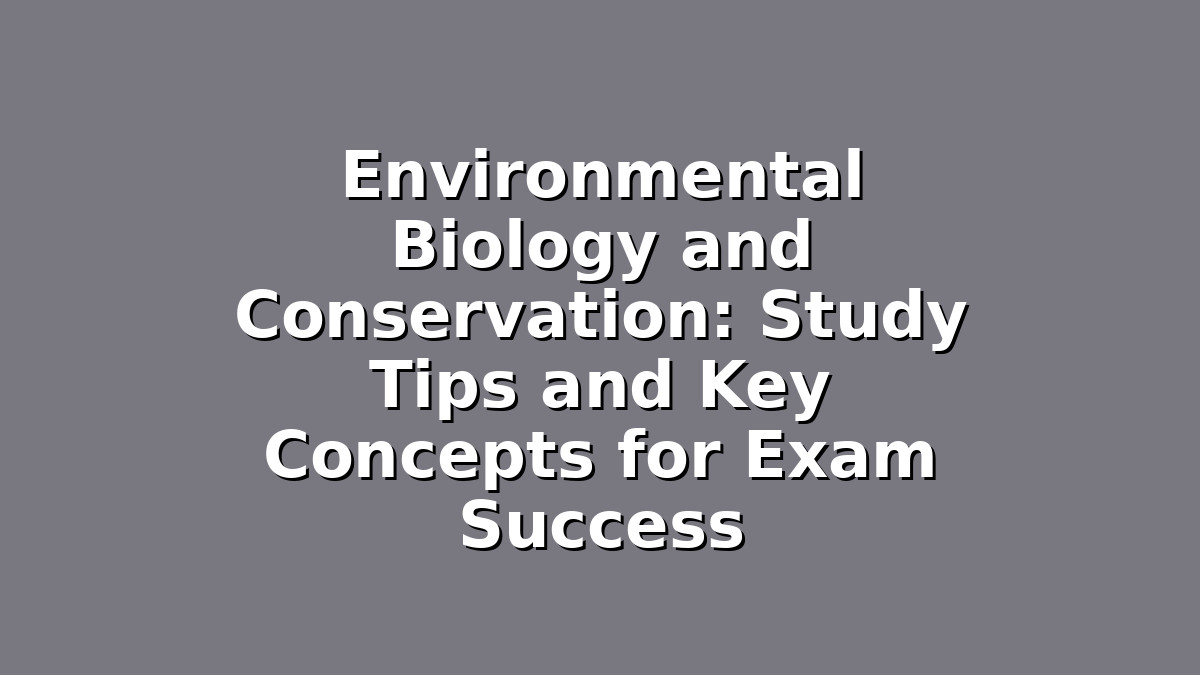Preparing for exams in Environmental Biology and Conservation can feel overwhelming due to the vast amount of information and the critical importance of understanding how living organisms interact with their environment. Whether you are a high school student, an undergraduate, or someone refreshing your knowledge for competitive exams, this guide is designed to help you grasp key concepts effectively and excel in your studies. In this article, we’ll explore essential topics within Environmental Biology and Conservation and provide practical study tips tailored to help you retain information, manage your time, and approach exam questions with confidence.
Understanding the Basics: Core Concepts in Environmental Biology
Before diving into exam preparation, it’s important to build a strong foundation in the core topics of Environmental Biology. This branch of biology focuses on the relationships between organisms and their environment, encompassing ecosystems, biodiversity, pollution, and sustainability.
Key topics to focus on:
– Ecosystem structure and function: Understand biotic (living) and abiotic (non-living) components, energy flow, food chains, food webs, trophic levels, and nutrient cycles such as the carbon and nitrogen cycles.
– Biodiversity: Learn about species diversity, genetic diversity, and ecosystem diversity. Familiarize yourself with the importance of biodiversity for ecosystem stability and human well-being.
– Conservation biology: Study the reasons for species endangerment, conservation strategies, protected areas, and the role of legislation like the Endangered Species Act or CITES.
– Environmental issues: Pollution (air, water, soil), climate change, deforestation, habitat destruction, and sustainable practices.
Study tip: Create concept maps linking these ideas visually. This helps you see how topics interconnect, making retrieval easier during exams.
—
Section 1: Effective Study Strategies for Environmental Biology
Environmental Biology is content-rich and often involves memorizing definitions, processes, and case studies. Here’s how to make your study sessions more productive:
1. Active Reading and Note-taking
Don’t just passively read your textbook or notes. Use active reading strategies by highlighting keywords, summarizing paragraphs in your own words, and jotting down questions that come to mind. After each chapter or section, write a short summary to consolidate what you’ve learned.
2. Flashcards for Terminology and Processes
Environmental Biology has many specific terms like “eutrophication,” “biomagnification,” and “carrying capacity.” Use flashcards to quiz yourself regularly. Apps like Anki or Quizlet can be very helpful for spaced repetition, which improves long-term retention.
3. Incorporate Visual Aids
Diagrams, charts, and videos can clarify complex processes such as nutrient cycles or ecological interactions. Drawing your own diagrams reinforces your understanding and serves as quick revision tools.
4. Practice Past Exam Questions
Try to get hold of previous years’ exam papers or sample questions from your syllabus. Practicing these under timed conditions helps you get familiar with question formats and sharpens your ability to recall information quickly.
—
Section 2: Tackling Conservation Topics with Real-World Context
Understanding conservation is not just about memorizing facts but appreciating the real-world implications and applying knowledge critically.
1. Case Studies Are Your Friends
Many exams include questions about specific conservation projects or endangered species. Learn a few detailed case studies, such as the conservation efforts for the Bengal tiger, the Great Barrier Reef, or reforestation programs. Focus on the causes of threats to these ecosystems/species and the solutions implemented.
2. Connect Conservation Biology to Current Events
Stay updated with news related to environmental policies, climate change conferences, or recent scientific discoveries. Relating your textbook knowledge to current affairs not only deepens understanding but also impresses examiners who value application-based answers.
3. Use Mnemonics and Acronyms
For example, to remember the causes of biodiversity loss, you might use the acronym HIPPO: Habitat loss, Invasive species, Pollution, Population (human overpopulation), and Overharvesting. Such memory aids make recall easier under exam stress.
—
Section 3: Time Management and Exam Techniques for Environmental Biology
Effective study is only half the battle; managing your exam time and answering questions strategically is equally important.
1. Break Your Study Sessions Into Chunks
Avoid cramming by dividing your revision into focused sessions with breaks in between (the Pomodoro Technique—25 minutes study, 5 minutes break—is highly effective). This keeps your brain fresh and reduces burnout.
2. Prioritize High-Weight Topics
Review your syllabus or past papers to identify which topics frequently appear or carry more marks. Allocate more revision time to these areas while maintaining a balanced approach.
3. Plan Your Answers
For essay or long-answer questions, spend a couple of minutes planning your answer before writing. Outline the key points and examples you want to include. This makes your response organized and comprehensive.
4. Use Diagrams and Examples
Where possible, support your answers with labeled diagrams, flowcharts, or real-world examples. Visuals can earn you extra marks and demonstrate a deeper understanding.
5. Review Your Answers
If time permits, always leave 5–10 minutes to review your answers. Check for any missing points, spelling errors in scientific terms, or unclear explanations.
—
Conclusion: Stay Motivated and Confident in Your Environmental Biology Journey
Environmental Biology and Conservation are vital subjects that not only test your knowledge but also your awareness of pressing global issues. By understanding core concepts, using active and varied study techniques, connecting theory to real-world scenarios, and honing your exam strategies, you can approach your exams with greater confidence and clarity.
Remember, consistent effort and curiosity are your best tools. Celebrate small victories as you progress, and don’t hesitate to seek help from teachers or peers when concepts seem challenging. Your work in this field contributes to a better understanding of our planet and its future.
Good luck with your studies—your commitment today lays the foundation for a healthier, more sustainable tomorrow!
—

Responses